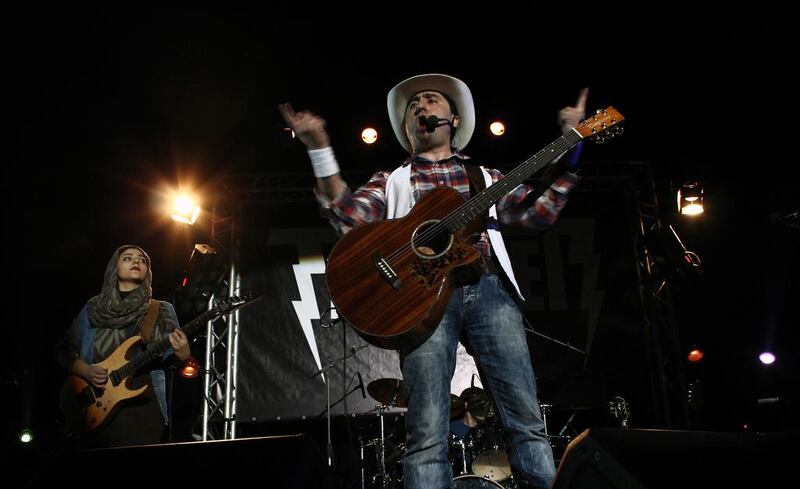At first glance, Thunder appear to be a typical rock band with country-tinged roots, fronted by a guy with chiselled good looks and sporting a chequered shirt and Stetson.
But look closer and you’ll notice three of his bandmates are sporting distinctly un-rock ’n’ roll headscarves. If you’re lucky, you might hear one of the women, Bita Sadeghi, spit out a squealing 80s-style guitar solo.
This crew of rockabilly punks hails from Iran, where they claim to be the first pop/rock group granted government permission to perform in English.
Iran is notorious for its strict laws governing what forms of live music and arts are acceptable.
But on January 23, Thunder made history – and headlines – with the first of four state-endorsed, sell-out gigs in front of hundreds of fans. In April they repeated the feat, playing to an audience of 1,700 people during two “official” shows at Tehran’s Arikeh Iranian.
UAE bound
Speaking ahead of the band’s UAE debut on Saturday, the founder, Ardavan Anzabipour, recalls just one other instance, years ago, of a classical singer being granted permission by the authorities to perform in a mix of Farsi and English.
“Before Thunder, nobody [had the] permission to play rock music in English,” says the 40-year-old musician, explaining that a mix of personal contacts and persistence helped his band to succeed where others had failed.
“The guys in the ministry want to make sure – ‘You guys are not going to go and make problems. You guys just play. Even though we don’t like your music, it’s OK.’ ”
Watching footage of the historic gigs, there’s something captivating about seeing this mixed-sex septet – three women and four men – confidently stride across the stage, something that is considerably more novel than the mix of metal riffing and cowboy swagger in their music.
Performing a mix of Anzabipour’s original compositions and cover versions of songs by the Eagles, Bob Seger and Garth Brooks, the band had to submit all of their lyrics to Iran’s ministry of culture and Islamic guidance to get the official stamp of approval.
“It’s country rock and it’s a little bit fun,” says Anzabipour. “Even the guys in the ministry [like it] – it’s not kind of heavy rock or demonisation, so they said ‘you’re safe’.”
Switching gears
The inspiration for Thunder came to Anzabipour as a teenager growing up in Rasht, when a high-school friend lent him a tape of a John Denver album.
Picking up a guitar at the age of 16, he switched to bass two years later and moved to Iran’s capital. There he benefited from the state’s mid-1990s decision to endorse home-created Iranian pop as a welcome alternative to western sounds.
Employed by the Islamic Republic of Iran Broadcasting, he appeared on more than 200 recordings during a 12-year career as a session musician. But his artistic soul was far from satisfied.
“The cash was very good,” he says, “but it wasn’t at all what I desired to play. I was so sad.”
To keep sane, he self-recorded an unreleased album of rock instrumentals under the name Thunder in 2000. That outfit's live line-up morphed into Kahtmayan, "the first official thrash-metal band in Iran". In 2005 they achieved the milestone of gaining a state-authorised release of their debut album Exir, another project without vocals – to avoid attracting the authorities' attention.
Thinking back to that John Denver cassette, Anzabipour says he always knew he wanted to replicate the classic vocal-led western rock ’n’ roll he loved.
After three years of voice coaching, in 2010 he revived the name Thunder, imbued it with a country influence, took to the mic and switched to acoustic guitar.
Having worked as a private music teacher he had little trouble building a line-up from the ranks of former students. Over the past four years the band have performed sporadically to small crowds inside cultural institutes and music conservatories, rock concerts where “everybody knows what it is, but it’s a cover”.
In August 2011, Thunder performed outside Iran for the first time when they played in Kiev and will follow up that achievement this weekend in Dubai.
On Persian Cats
A popular view of Iran's underground rock scene comes from the award-winning Cannes docudrama No One Knows About Persian Cats. But the mere mention of the cult favourite causes Anzabipour to break into a lengthy fit of laughter.
“It’s a lie,” he says eventually, before criticising the director. “We have so many problems here – but someone going to jail for music? It never happened. It’s not true. How can you imagine a rock band playing [in a room] with cows and horses? It’s a joke.”
Much has been said in the international press about the liberalisation that followed the election of President Hassan Rouhani in August last year. So, how is the contemporary Iranian music scene looking today?
“In some areas, good. In metal music, orchestral music, we have so many good rock bands. But they have not enough chances to play,” says Anzabipour. “It’s not just because of the government and the licences – it’s because of the people.”
rgarratt@thenational.ae





